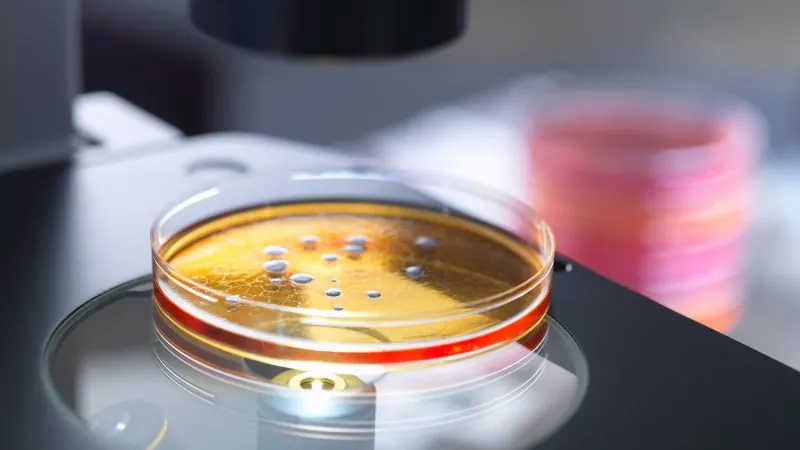
Scientists Warn of Dangers Posed by Potentially Synthetic Mirror Bacteria
2024-12-16
Author: Lok
Introduction
In a groundbreaking report that has shaken the scientific community, a consortium of 38 researchers from nine different countries has raised serious concerns over the potential development of synthetic "mirror bacteria." These organisms would feature reversed molecular structures compared to those found in nature, and the implications could pose unprecedented risks to human health and ecosystems alike.
Current Status of Mirror Bacteria Research
While the creation of such mirror bacteria is still a decade away—requiring substantial advancements in science and technology—the alarm has been sounded, warning that this new area of synthetic biology hasn't received the attention it warrants. In their article published on December 12 in the journal *Science*, the researchers assert that the risks associated with these synthetic organisms could be catastrophic if left unchecked.
Expert Opinions on Risks
“What we are talking about could be a radical departure from all known forms of life," said Jonathan Jones, one of the report's coauthors and a group leader at The Sainsbury Laboratory in the United Kingdom. He cautioned that, while the probability of a serious event occurring might be low, the potential fallout could be disastrous. “It’s a genie you don’t want to let out of the bottle,” he elaborated.
Chirality and Molecular Recognition
One of the intriguing aspects of the report is the concept of chirality, or handedness. DNA and proteins exhibit a uniform chirality: DNA is made from "right-handed" nucleotides, whereas proteins consist of "left-handed" amino acids. This specificity is crucial to their functionality; for instance, a glove designed for a right hand cannot fit a left hand. Consequently, if mirror bacteria were ever realized, they could confuse molecular recognition within immune systems, potentially rendering organisms—including humans—more susceptible to infections.
Foundation of Concerns
The foundation for the scientists' concerns stems from the comprehensive 300-page technical report published by the J. Craig Venter Institute. This report outlines current research and technical obstacles while highlighting the risks posed by synthetic organisms. Although the possibility of creating mirror life currently resides in the realm of theoretical aspirations of various laboratories, the drive behind this research is to deepen our understanding of the origin of life and explore new therapeutic possibilities.
Calls for Caution
Importantly, the authors of the report urge that unless compelling evidence emerges proving that mirror life will not pose extraordinary threats, any research aimed at creating these organisms should not proceed. They recommend that funders in the scientific community clearly communicate that they will not support such risky endeavors.
Ecosystem Implications
Concerns with mirror bacteria extend beyond human health. The potential for these organisms to invade various ecosystems is alarming. The authors suggest that, if mirror bacteria were introduced into the environment, they could act as invasive species, leading to unprecedented and severe consequences for numerous plant and animal species. The transmission of these pathogens could occur between animals and humans, spreading them across diverse ecosystems.
Debate in the Scientific Community
Not everyone in the scientific community agrees on the immediate threat posed by mirror bacteria. Tom Ellis, a professor at Imperial College’s Centre for Synthetic Biology, describes the idea of mirror life as more “science fiction” than “science fact” at this stage. He acknowledges the speculative nature of the report’s findings, given that research into synthetic life using conventional molecules has already proven exceedingly difficult and far from achieving self-sustaining cells.
Conclusion
In conclusion, while the vision of creating mirror bacteria remains deep in the future, the warning signals from experts should not be ignored. As scientific curiosity drives researchers forward, the need for cautious exploration in synthetic biology has never been more critical. The implications of letting the mirror bacteria genie out of the bottle could be far-reaching and profoundly disruptive to the intricate tapestry of life on Earth.


 Brasil (PT)
Brasil (PT)
 Canada (EN)
Canada (EN)
 Chile (ES)
Chile (ES)
 España (ES)
España (ES)
 France (FR)
France (FR)
 Hong Kong (EN)
Hong Kong (EN)
 Italia (IT)
Italia (IT)
 日本 (JA)
日本 (JA)
 Magyarország (HU)
Magyarország (HU)
 Norge (NO)
Norge (NO)
 Polska (PL)
Polska (PL)
 Schweiz (DE)
Schweiz (DE)
 Singapore (EN)
Singapore (EN)
 Sverige (SV)
Sverige (SV)
 Suomi (FI)
Suomi (FI)
 Türkiye (TR)
Türkiye (TR)